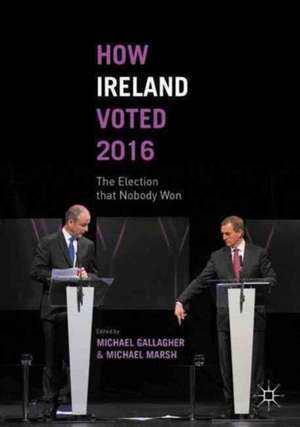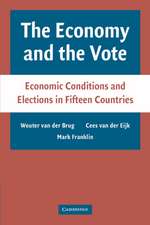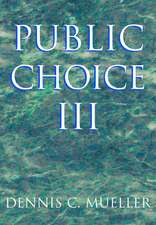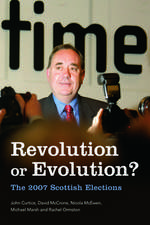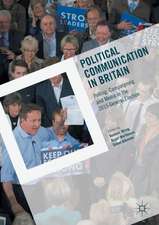How Ireland Voted 2016: The Election that Nobody Won
Editat de Michael Gallagher, Michael Marshen Limba Engleză Paperback – 4 noi 2016
Preț: 241.63 lei
Nou
Puncte Express: 362
Preț estimativ în valută:
46.25€ • 50.26$ • 38.88£
46.25€ • 50.26$ • 38.88£
Carte tipărită la comandă
Livrare economică 16-22 aprilie
Preluare comenzi: 021 569.72.76
Specificații
ISBN-13: 9783319408880
ISBN-10: 3319408887
Pagini: 315
Ilustrații: LII, 327 p. 100 illus., 51 illus. in color.
Dimensiuni: 148 x 210 x 17 mm
Greutate: 0.63 kg
Ediția:1st ed. 2017
Editura: Springer International Publishing
Colecția Palgrave Macmillan
Locul publicării:Cham, Switzerland
ISBN-10: 3319408887
Pagini: 315
Ilustrații: LII, 327 p. 100 illus., 51 illus. in color.
Dimensiuni: 148 x 210 x 17 mm
Greutate: 0.63 kg
Ediția:1st ed. 2017
Editura: Springer International Publishing
Colecția Palgrave Macmillan
Locul publicării:Cham, Switzerland
Cuprins
Chapter 1. The Background to the Election.- Chapter 2. The Selection of Candidates.- Chapter 3. Campaign Strategies and Political Marketing.- Chapter 4. The View from the Campaign Trail .- Chapter 5. The Election results and the New Dáil.- Chapter 6. How the Voters Decided.- Chapter 7. Women and the Election.- Chapter 8. The Seanad Election.- Chapter 9. The Formation of the Government.- Chapter 10. Implications for the Irish Party System.
Notă biografică
Michael Gallagher is Professor of Comparative Politics in the Department of Political Science in Trinity College Dublin, Ireland. He has published on parties, elections and electoral systems. Recent books as co-editor include Politics in the Republic of Ireland, (5th ed, 2010), Representative Government in Modern Europe (5th ed, 2011) and The Politics of Electoral Systems (2008). He has been a visiting professor at City University of Hong Kong, Université de Lille and New York University.
Michael Marsh is Emeritus Professor of Political Science in Trinity College University of Dublin, Ireland, and was formerly Professor of Comparative Political Behaviour, and served variously as Dean of Arts, Humanities and Social Sciences and Vice Provost/Chief Academic Officer of the University. He has published over 100 professional articles and book chapters on parties, elections and public opinion, and was principal investigator for the 2002, 2007 and 2011 Irish National Election Studies, co-author of The Irish Voter (2008) and co-editor of The Conservative Revolution (2016).
Michael Marsh is Emeritus Professor of Political Science in Trinity College University of Dublin, Ireland, and was formerly Professor of Comparative Political Behaviour, and served variously as Dean of Arts, Humanities and Social Sciences and Vice Provost/Chief Academic Officer of the University. He has published over 100 professional articles and book chapters on parties, elections and public opinion, and was principal investigator for the 2002, 2007 and 2011 Irish National Election Studies, co-author of The Irish Voter (2008) and co-editor of The Conservative Revolution (2016).
Textul de pe ultima copertă
This book is the definitive analysis of the 2016 Irish general election and is the eighth book in the well-established How Ireland Voted series. The 2011 election in Ireland was characterised as an earthquake, but the aftershocks visible in the 2016 election were equally dramatic. This election saw the rout of the government that had presided over a remarkable economic recovery, and marked a new low for the strength of the traditional party system, as smaller parties and independents attracted almost half of all votes. The first chapter sets the context, and later ones investigate the extent to which the outgoing government fulfilled its 2011 pledges, and how candidates were selected. The success or otherwise of campaign strategies is assessed, the results and the behaviour of voters are analysed, and the aftermath, when it took a record length of time to form a government, is explored. Other chapters examine the consequence of new gender quotas for candidate selection, consider thereasons for the unusual success of independents, and reflect on the implications. The book also reveals intriguing insights into the candidates’ experiences of the election, both successful and unsuccessful. It will be of use to students, teachers and scholars of Irish politics, as well as the wider reader interested in Irish politics and elections.
Caracteristici
Provides a comprehensive account of Ireland's exciting 2016 General Elections Features contributions by distinguished scholars analysing the election and by practising politicians giving their accounts of the campaign Includes analysis of voting behaviour, gender quotas, and government formation
